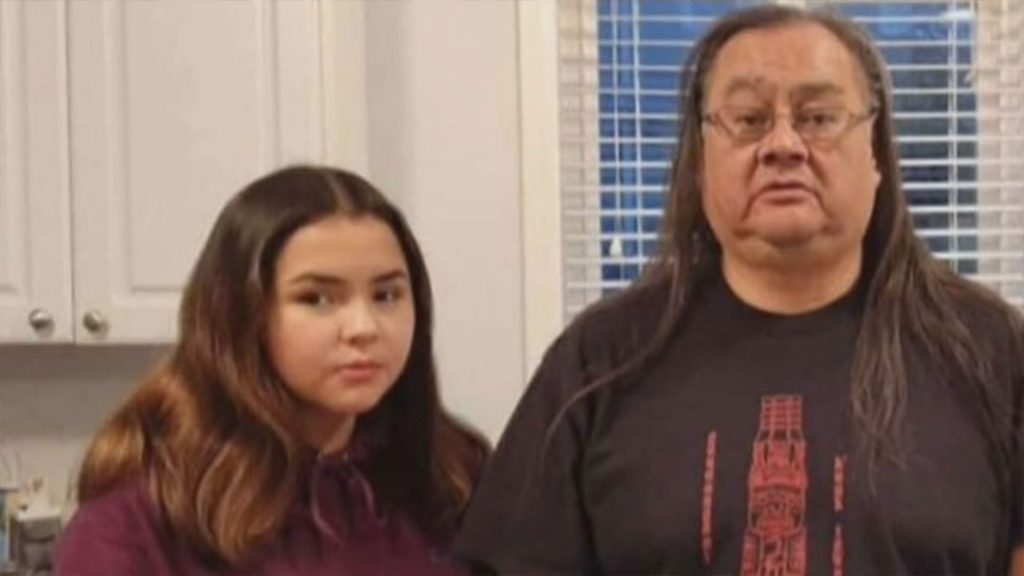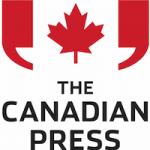
Maxwell Johnson (right), with his granddaughter, was accused of fraud and handcuffed outside a Vancouver branch of the Bank of Montreal after using his status card as identification. Photo: APTN file
Vancouver’s police board and the Heiltsuk Nation both say they are committed to working together after a report found their relationship had “broken down” in the wake of a landmark agreement.
But the First Nation in B.C. says it is still owed an apology from two officers involved in the wrongful handcuffing of a Heiltsuk Elder and his granddaughter outside a Vancouver bank in 2019.
B.C. Human Rights Commissioner Kasari Govender on Wednesday released a review of the September 2022 settlement stemming from the case.
Govender said in the report that there were “significant shortcomings” in implementing the deal in the time since an agreement was reached.
Behind the shortcomings were fractured ties between the Heiltsuk Nation and the Vancouver Police Board that “must be repaired” in order for the settlement’s implementation to move forward, she said.
The Heiltsuk Nation said police officials had not reached out since an apology ceremony in October 2022 was cancelled because the two officers involved in the handcuffing did not attend.
“The board says that the constables complied with their discipline sanction by sending the written apologies,” said Heiltsuk Nation Chief Marilyn Slett. “But that doesn’t recognize and respect our culture.
“It doesn’t respect reconciliation, and it doesn’t live up to the settlement agreement.”
In a written statement, Vancouver Police Board vice chair Frank Chong said it is “deeply committed to working together” with the Nation and the family of Maxwell Johnson, the Heiltsuk artist who was detained with his then 12-year-old granddaughter after they tried to open an account at the bank.
“Since 2019, the Vancouver Police Department and the Board have implemented a significant number of new policies, procedures, cultural awareness initiatives, as well as other training developed in consultation with the VPD’s Indigenous Advisory Committee,” Chong said.
He said the board was committed to working with the Heiltsuk Nation “to resolve current disagreements and find a path forward together.”
In her report, Govender said the relationship between the police board and the First Nation was fundamental to the execution of the agreement, “as proceeding with the enumerated changes to policing in isolation from the nation risks perpetuating the very racism it seeks to address.”
“However, the relationship between the parties seems to have broken down … if we are truly committed to reconciliation and decolonization, this is not an opportunity we can afford to waste.”
Govender, who was named as a third-party reviewer in the settlement, said she is urging the parties to recommit to the promise of a landmark agreement and to move forward in a way that respects Heiltsuk law.
Relations have been fractured since the no-show by the arresting officers, which Johnson said limited the community’s ability to heal from the incident.
Slett said she was glad to see Govender’s report recognized the importance of the community’s traditions and laws, including the essential role of an apology ceremony for reconciliation.
She added that she agreed with Govender’s assessment that the situation has stalled the “critical anti-racist policing reform work” under the agreement.
“It’s not great that we’re at this point where there’s a year left in this agreement,” Slett said. “And there’s lots of work to do around the implementation of the policy work and the other work that we had agreed to do within the agreement.
“We’ve definitely kept that door open, and we would welcome any meeting that would help move the apology ceremony further along … we’re not aware of the Vancouver Police Board’s efforts, and that’s been really frustrating.”
The settlement agreement reached in 2022 included an admission by the police board that its officers contravened the Human Rights Code, as well as a $100,000 payment to the Heiltsuk Tribal Council and an undisclosed award to Johnson.
The settlement agreement said it expected the two officers involved to attend the 2022 ceremony but it wasn’t mandatory, and instead it committed the police board to “ensure best efforts” that the officers attend.
The Vancouver Police Board said at the time of the ceremony that the board was the respondent in the human rights case launched by Johnson, not the constables.
Govender said in her report she hopes the findings work as a “call to action” to restart the conversation between parties.
“I urge the parties to recommit to the purpose of this agreement rather than getting caught up in legal wranglings,” she said.










